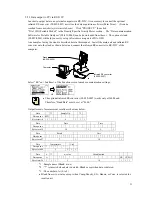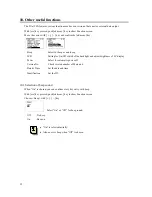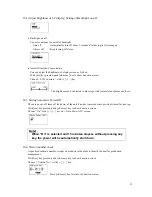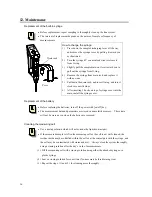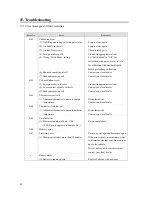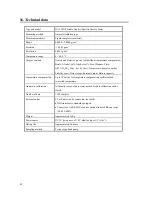
44
Appendix 1: Density of pure water (0
∼
40
°
C)
Temp.
(
°
C)
Density
(g/cm
3
)
Temp.
(
°
C)
Density
(g/cm
3
)
Temp.
(
°
C)
Density
(g/cm
3
)
Temp.
(
°
C)
Density
(g/cm
3
)
0
0.99984
1 0.99990 11 0.99961 21 0.99799 31 0.99534
2 0.99994 12 0.99950 22 0.99777 32 0.99503
3 0.99996 13 0.99938 23 0.99754 33 0.99471
4 0.99997 14 0.99925 24 0.99730 34 0.99438
5 0.99996 15 0.99910 25 0.99705 35 0.99404
6 0.99994 16 0.99894 26 0.99679 36 0.99369
7 0.99990 17 0.99878 27 0.99652 37 0.99333
8 0.99985 18 0.99860 28 0.99624 38 0.99297
9 0.99978 19 0.99841 29 0.99595 39 0.99260
10 0.99970 20 0.99821 30 0.99565 40 0.99222
Appendix 2: Temperature compensation coefficient for various
liquids
Substance
Range (
°
C)
α×
10
3
/
°
C
Substance
Range (
°
C)
α×
10
3
/
°
C
Ethanol 0~30
1.09
Benzene
6~30
1.21
m
-Xylene 0~30
0.99
Methanol
6~30
1.18
p
-Xylene 15~30
1.02
Acetone
0~30
1.42
Glycerine 15~30
0.49
Bromobenzene
0~30
0.91
Chloroform 0~30
1.26
Cyclohexane
0~30
1.20
Carbon tetrachloride
0~30
1.22
Isopropanol
0~30
1.06
Toluene 0~30
1.07
n-Nonane
0~30
1.08
Note!
The above alpha (
α
) is the coefficient for temperature compensation to convert
the measured data at 30
°
C of sample temperature to that at 15
°
C.
The compensation coefficient will slightly differ if sample temperature or
compensation temperature differs. If a precise temperature-compensated
density is required, such coefficient should be obtained from the following
formula, where temperature compensation coefficient (
α
) is obtained from the
density (Comp. Density) at compensation temperature and the measured
density (Density) at the measurement temperature (Temp):
temp
Comp
Temp
Density
Density
Comp
a
.
1
)
/
.
(
−
−
=
Example: in the case of ethanol with 0.79351g/cm
3
at 15
°
C, 0.78924g/cm
3
at
20
°
C and 0.78495g/cm
3
at 25
°
C, the temperature compensation coefficient can
be obtained as follows when measured values on the samples at 15
°
C and
25
°
C are converted hycompensation to those at 20
°
C.


